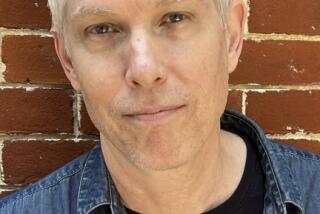John Rechy’s ‘City of Night’ turns 50
This post has been corrected. See the note below.
I spent part of Wednesday afternoon at UCLA, on a panel to celebrate the 50th anniversary of John Rechy’s novel “City of Night,” newly reissued to commemorate the occasion. The book is a landmark not only of gay literature -- it tells the story of a street hustler as he moves through the shadow world of the 1950s -- but also of American literature.
“City of Night” was not the first overtly gay-themed book (Radclyffe Hall’s “The Well of Loneliness” appeared in 1928, and in 1956, Allen Ginsberg published his long poem “Howl,” followed, three years later, by William S. Burroughs with “Naked Lunch”) but it may be the most unapologetic, a searing screed of life on the edge.
“Later I would think of America as one vast City of Night,” Rechy writes in the novel’s opening sentence, “stretching gaudily from Times Square to Hollywood Boulevard -- jukebox-winking, rock-n-roll-moaning: America at night fusing its darkcities into the unmistakable shape of loneliness.”
If there is, in the rhythms of that line, something of the Beat aesthetic (like Jack Kerouac and company, Rechy published in journals such as Evergreen Review and Big Table; his novel was released by Grove Press), “City of Night” is not a Beat book, but rather something darker: the testimony of someone who knows that he will never belong.
For Rechy, such a status was multi-tiered. He was not just a gay writer, but a Mexican American writer, born and raised in El Paso, and later, after he settled in Los Angeles, a California writer as well.
And yet, Rechy remains misunderstood, even marginalized, an outsider even in the cultures of which he is a part.
“Today,” he once lamented, “I find myself a ‘Texas writer’ left out of discussions of Texas writers, a ‘Chicano writer’ omitted from anthologies of Chicano writers, a ‘California writer’ ignored in books about California. And even though I am excluded from several anthologies of homosexual writers, I am often designated as ‘a gay writer.’”
At UCLA, the panel discussed Rechy “the Mexican American writer, the gay writer, and the L.A. writer,” in a series of presentations on the author and his work. Sponsored by UCLA’s Chicano Studies Research Center, the event was organized by professor Héctor Calderón, and also featured Doors drummer John Densmore (who traced the influence of “City of Night” on the song “L.A. Woman,” with its refrain of “city at night”), as well as Rechy himself.
Rechy is 82 now, and last published a book, the memoir “About My Life and the Kept Woman,” in 2008. Yet lest his influence appear diminished, let’s just think about the seismic shifts in our attitudes toward gay rights over the last 50 years.
I wrote about this in June, when the Supreme Court dispensed with the Defense of Marriage Act, but it bears restating: “City of Night” was an essential early step in the integration of gay life into the American mainstream, a subversive book in the best sense of the word because it provokes a profound empathy.
“When I first realized I was homosexual,” Rechy writes, “I prayed to be changed. I felt guilty, as if I had committed a crime -- and the only crime had been in making me feel guilty.” This may seem like tame stuff now, but in the early 1960s it was revolutionary.
A gay man as human being, complex, nuanced, not as some kind of deviant (“a parade of perverts,” the Los Angeles Herald-Examiner called the Hollywood gay-rights parade on its editorial page as late as 1976): This is where it all begins. Rechy made that explicit in his 1977 book “The Sexual Outlaw,” which includes an account of that parade as a turning point in the way gay people thought about themselves.
All these years later, we live, at least in part, in a world Rechy helped imagine into being. “It is the writer,” he has written, “who continues to try to know the hidden heart. ... Think of the lives left buried if you don’t explore them, and, yes, the cruelties left unexposed.”
ALSO:
Interviewing William Burroughs
DOMA, John Rechy and the land of the free
Barney Rosset, contemporary literature’s champion
[Updated, 2:05 p.m., Nov. 12: The UCLA panel celebrating the 50th anniversary of John Rechy’s novel “City of Night” was sponsored by the UCLA Chicano Studies Research Center. Initally, the post said it was co-sponsored by by the César E. Chavez Department of Chicana/o Studies and the Department of Spanish and Portuguese.]
More to Read
Sign up for our Book Club newsletter
Get the latest news, events and more from the Los Angeles Times Book Club, and help us get L.A. reading and talking.
You may occasionally receive promotional content from the Los Angeles Times.







